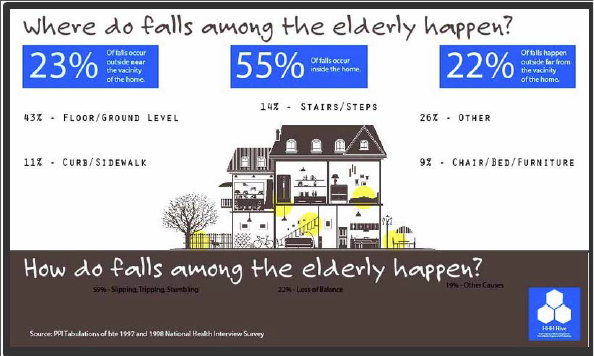One Slip Could Change a Life: Preventing Falls by the Elderly in the Home
Preventing Falls can make all the difference for the elderly to be successful in remaining in their own home. What started as a normal day for one family ended with a serious scare when an elderly aunt who was 96 years old blacked out and fell in the bathroom at an assisted living facility. She was rushed to a nearby hospital in pain and with bruises. Her legal guardian, a niece, drove over 100 miles to meet her, and came almost every day for many weeks. She had cuts all over her arms, which required daily dressing changes, and needed around the clock care that was never necessary before the fall. After a few days, she was moved to a rehab nursing home with 24/7 therapeutic support. She will not return to the life she was living just a few weeks prior. By taking actions in preventing these falls, her outcome could have been much different.
This story is very common across the United States. One in three people over the age of 65 will fall at least once a year, and falls are the leading cause of injuries for this demographic (Source). The emergency room treats an older adult for a fall every 14 seconds (Source). Even if the fall is not serious, older people become fearful of another one, and limit their activity to try and avoid it, sometimes leading to depression. Luckily, most falls are preventable with the right knowledge and precautions.
Falls can be caused by the home environment, the person’s physical condition, or use of drugs that could affect attention or balance. Often times, a fall occurs when multiple causes come together. More than half of falls among the elderly happen due to slipping, tripping, and stumbling, and are often inside the home. The biggest problem areas are the bathroom and stairs.
 Many falls can be prevented with a few simple modifications to a person’s home or lifestyle. There are many home modifications suggested for seniors, such as removing loose throw rugs (or taping down the edges), removing cords from areas where people walk, adding sturdy hand bars by the toilet and shower, adding anti-slip tile, and ensuring proper lighting in the home. In addition to changes in the home, an elderly person can also take a few extra steps to ensure their safety. These are other areas to be addressed:
Many falls can be prevented with a few simple modifications to a person’s home or lifestyle. There are many home modifications suggested for seniors, such as removing loose throw rugs (or taping down the edges), removing cords from areas where people walk, adding sturdy hand bars by the toilet and shower, adding anti-slip tile, and ensuring proper lighting in the home. In addition to changes in the home, an elderly person can also take a few extra steps to ensure their safety. These are other areas to be addressed:
- Meeting regularly with an eye doctor can help seniors stay independent and safe. Aging can cause sight and hearing issues. They should have up to date eyeglasses that allows them to see both up-close and distance, and a hearing aid if necessary (Source).
- Monitor alcohol consumption and limit their intake as much as possible. This is even more important when they are taking medications that could have dangerous side effects when combined with alcohol.
- Less than 40% of older Americans exercise, resulting in an elevated risk of falling. Taking a Tai Chi or yoga class, walking, dancing, or similar activities are all healthy options. Physical therapists can teach patients how to exercise safely to improve muscle strength, balance, and go through daily movements without straining themselves (Source).
- Investing in a pair of shoes with good traction and low, rubber heels could be a big help in making a senior feel more confident and secure (Source).
- Taking multiple medications can result in interactions that may cause falls. Patients should talk to their doctors about any potential side effects and interactions between medications. Remember to let their doctor know about any over the counter medications, such as pain relief or sleep aids.
- Canes and walkers are helpful, but only if used correctly. When buying a cane, get one that is properly fitted (not too tall or too short) and work with a therapist to learn what the proper techniques are to walk safely with one (Source).
While falls are not fatal, they can be very harmful for seniors. Typical outcomes can be broken bones or serious bruising. If serious enough, a fall could prevent a loved one from having normal life. The outcome from trauma like this puts stress on family members who must become caregivers. Another option is to retain the service of a homecare agency to help their loved one manage tasks around the house. Preventing falls by the elderly is key when it comes to keeping a loved one safe and in their home for years to come.

